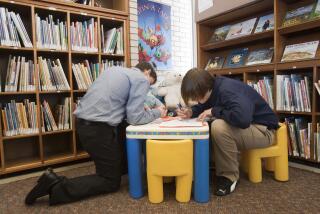National Service? No thanks
If only John F. Kennedy could have known that his inaugural address call to service in 1961 -- “ask not what your country can do for you -- ask what you can do for your country” -- would become the rallying cry for generations of rich, middle-aged men to tell us sub-30 ingrates that we’re unpatriotic runts who aren’t doing enough.
Never mind that Kennedy’s seductively quotable phrase was in a larger Cold War context of encouraging Americans to show why we’re better than those Commie Soviets; beating up on upwardly mobile twentysomethings is the gift that keeps on giving. Try it yourself: “Young people don’t ______ enough.” (I’ll get you started -- vote, work, suffer, go to church, serve in the military....)
This attitude stops being funny, however, when pundits and politicians -- especially presidential candidates -- start calling for policies based on it. Mix in a free-for-all presidential election (in wartime, no less), and let the Gen Y shaming begin!
The latest example comes in the Sept. 10 cover story of Time magazine. In it, writer Richard Stengel argues that the next president should dramatically expand and remake U.S. national service programs to capitalize on historically high rates of volunteerism. Stengel’s national service wouldn’t be mandatory, but it would involve Washington spending billions of dollars to induce citizens into programs such as a health corps and service academy. Who would do all this volunteering? Us young ‘uns, of course:
It is the simple but compelling idea that devoting a year or more to national service, whether military or civilian, should become a countrywide rite of passage, the common expectation and widespread experience of virtually every young American.
Aside from the logically perplexing call for a national service program that’s “universal” without being “mandatory” (I imagine government ads similar to anti-smoking TV spots that shame non-volunteers into conscription), Stengel and others who support such programs never explain in practical terms just why it is that young folks should be the ones doing the volunteering. Intentional or not, national service proponents rely on the common assumption that youth should be put to work because, well, they’re youth!
Just because Stengel stops short of mandatory service doesn’t mean others don’t go there. Sen. Chris Dodd (D-Conn.) has made national service the centerpiece of his longshot presidential bid -- and part of his plan wouldn’t be optional. Dodd, who volunteered for the Peace Corps when the program was in its infancy, wants to require every student in the U.S. to perform 100 hours of community service before they graduate high school. And he isn’t alone -- fellow Democrat John Edwards, according to Time, wants a similar service requirement for high school grads. Imagine their American utopia: millions of uninspired teenagers ditching homework to perform involuntary servitude. Can’t you feel the civic pride?
What proposals like Stengel’s, Dodd’s and Edwards’ have in common is that they target students and young citizens who aren’t wealthy. Stengel’s financial carrots (he suggests a $5,000 federally funded “baby bond” that would mature to about $19,000 by the time someone is old enough to volunteer) are too small to entice the rich to serve. Foisting service on public high school students is even more sinister. After all, poor children are far more likely to seek free public education than wealthy ones, and a program such as Dodd’s would force students most likely to be at the receiving end of community service into, well, community service.
So are any of these plans likely to happen? The answer is, of course, no. Various calls for universal service -- both in California and nationwide -- have come and gone, and the most recent round of youth-busying proposals will likely fade with the campaign season. But because it’s easy to tell those of us who happen to have been born less than 30 years ago that we should do something for our country, don’t expect the verbal shaming to end any election cycle soon. This is at least one area in which we can be grateful for politicians’ fickleness.
Paul Thornton is a researcher for The Times’ editorial page; click to read more of his Opinion Daily columns. Send us your thoughts at [email protected].
More to Read
A cure for the common opinion
Get thought-provoking perspectives with our weekly newsletter.
You may occasionally receive promotional content from the Los Angeles Times.











